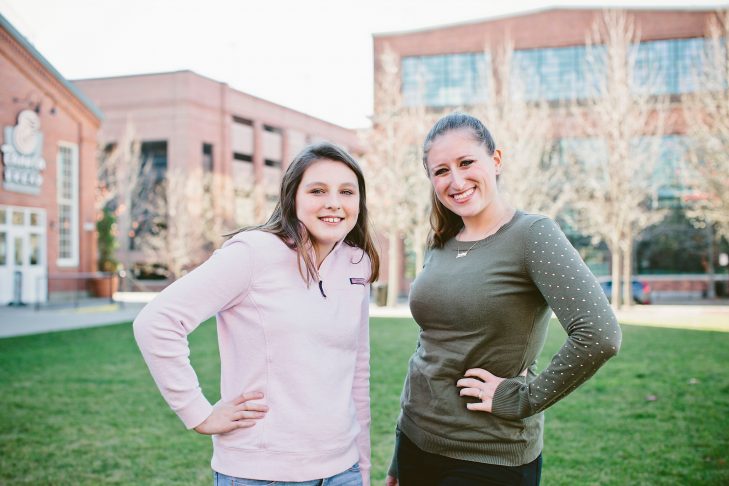Twice a month, for a few hours on a Saturday or Sunday, I spend time with an amazing teenage girl. Sometimes we talk about Shawn Mendes, soccer or high school. Other times, we talk about voting, discrimination or religion. We always laugh and we frequently go to Shwarma King in Brookline to share a meal. At just 14, my Little Sister has taught me more about resilience than many adults I know.
I signed up for Jewish Big Brothers Big Sisters (JBBBS) after a coworker told me about the organization’s Friend 2 Friend adults with disabilities program. She had been matched with a woman and got together with her one evening a month with others who had been similarly matched for a planned group activity. Neither she nor her match were Jewish, but they both loved attending the community events together, which included celebrations around the Jewish holidays. I had been looking for volunteer opportunities in the community and was excited to become part of a program my coworker loved so much.
After applying, I spoke on the phone with the outreach manager at JBBBS. While I had originally intended to volunteer with the Friend 2 Friend MAGIC program, she explained to me that there were three different programs at JBBBS looking for volunteers. If I wanted to work with adults with disabilities, I could participate in the MAGIC program. Another option was the Friend 2 Friend community program, where matches create their own schedules and get together once or twice a month, instead of attending designated events. The third option was to volunteer as a Big Sister for a child in the community.
Having worked at Boston Children’s Hospital since graduating from college almost three years ago, much of my job has consisted of working with young children who come in for study visits in a cognitive neuroscience lab. I was excited about the idea of becoming a Big Sister, as I would get to build a deeper, one-on-one relationship with a young child that revolved around activities we both enjoyed. While this program involved more of a time commitment where I would see my Little two to four times per month, I decided being a Big Sister was the best fit for me.
Going into my interview at JBBBS, I was sure I wanted to be paired with a younger child. Most of my work experience has been interacting with 3-, 5- and 9-year-olds, so I was most comfortable with those age groups. However, at the end of my interview, the social worker told me I would be paired with a teenage girl who was looking for a match. She loved art, reading and watching sports. She also had fled from her home country under threat of violence and her parents were hoping she could learn more about America and the Boston community from a Big Sister.
While initially unsure about whether or not I could be a good support for my Little Sister, my nerves were put at ease the first time we met with our assigned social worker. My Little eagerly showed me the art she made in after-school programs and sketches of dresses she was designing. We slowly built a rapport and she began trusting and turning to me for advice when faced with difficult situations at school or at home. We continue to learn from one another and are each other’s biggest cheerleaders.
While I grew up active in the Greater Boston Jewish community, my Little Sister is not Jewish. While many volunteers and mentees are Jewish, the agency welcomes people of all backgrounds. The staff at JBBBS has been instrumental in helping my Little access resources in the community beyond providing her with a Big Sister. One of the many reasons I am so proud to volunteer with JBBBS is that the organization’s professionals make an active effort to serve adults and children across religion, race, gender, sexual identity and orientation, and ability. They also provide financial supports, such as camp and college scholarships and emergency financial assistance, coaching and referrals to other social service agencies. The social worker assigned to support my Little Sister and me has gone above and beyond to make sure both of us feel comfortable with our match. She also has been invaluable in helping me to navigate as a mentor.
More than anything else, being a Big Sister has been incredibly rewarding. I am constantly proud of my Little Sister and admire the grace and humility with which she carries herself. I hope I have taught and guided her in the right way. I know she has certainly done that for me.
This post has been contributed by a third party. The opinions, facts and any media content are presented solely by the author, and JewishBoston assumes no responsibility for them. Want to add your voice to the conversation? Publish your own post here. MORE



